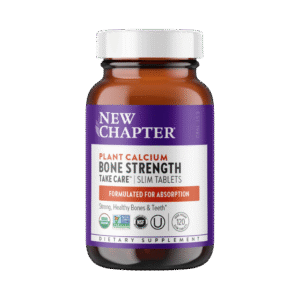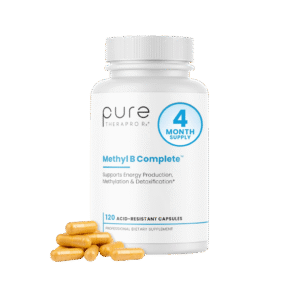The best multivitamins for women over 30 can help fill nutritional gaps, support hormones, and protect your energy but not all formulas are created equal.
Your 30s are a transformative decade for your health. Between career demands, potential family planning, hormonal shifts, and the early whispers of perimenopause, your body is juggling more than ever before. Even if you’re eating well, research shows that most women over 30 fall short on critical nutrients like iron, magnesium, vitamin D, and B vitamins—deficiencies that can quietly drain your energy, disrupt your hormones, and compromise your long-term health.
The right multivitamin isn’t just nutritional insurance—it’s strategic support for this pivotal life stage. But here’s the problem: not all multivitamins are created equal. Many contain synthetic nutrients your body can’t properly use, include ineffective forms of minerals that pass straight through you, or hide behind “proprietary blends” that leave you guessing what you’re actually getting. Some contain too much of what you don’t need (like excessive vitamin A) and not enough of what you do (like methylated B vitamins).
This comprehensive guide will show you exactly what to look for in a quality multivitamin, which nutrients matter most for women over 30, how to spot red flags in supplement labels, and how to maximize absorption so your body actually benefits from what you’re taking.
Why Multivitamins Matter More After 30
Your 30s mark a pivotal decade for your health. Hormonal shifts, increased stress, career demands, family planning considerations, and early perimenopause symptoms can all place new nutritional demands on your body.
Even if you maintain a “healthy” diet, research shows that most women fall short on key nutrients. Here’s why:
- Stress depletes nutrients faster – Chronic stress burns through B vitamins, magnesium, and vitamin C at accelerated rates
- Hormonal changes increase needs – Fluctuating estrogen and progesterone affect how your body uses nutrients
- Soil depletion reduces food quality – Modern farming practices mean produce contains fewer minerals than decades ago
- Medication interactions – Birth control, PPIs, and other medications can block nutrient absorption
- Decreased absorption with age – Your digestive system becomes less efficient at extracting nutrients from food
The Most Common Nutrient Gaps in Women 30+
According to the National Health and Nutrition Examination Survey (NHANES), these are the nutrients most women over 30 are deficient in:
- Iron – Especially critical if you menstruate heavily or are planning pregnancy
- Magnesium – Over 50% of women don’t get enough; crucial for stress, sleep, and hormones
- Vitamin D – 90% of women are insufficient, affecting bone health, immunity, and mood
- B Vitamins – Essential for energy production, brain function, and hormone metabolism
- Folate – Critical for fertility, detoxification, and preventing birth defects
- Iodine – Often overlooked but essential for thyroid function
- Potassium – Most women fall 500-800mg short daily, affecting heart and muscle health
Understanding which nutrients you need is the first step. Let’s dive deeper into each one.
The Essential Nutrients Women Over 30 Need
Once you hit your 30s, your body needs extra support to stay balanced, energized, and strong. Some of the key nutrients include:
1. Iron
Why it matters: Iron deficiency is the most common nutritional deficiency worldwide, affecting up to 30% of menstruating women. Without adequate iron, your body can’t produce enough hemoglobin to carry oxygen to your cells, leading to:
- Persistent fatigue and weakness
- Brain fog and difficulty concentrating
- Hair loss and brittle nails
- Pale skin and cold sensitivity
- Rapid heartbeat and shortness of breath
How much you need:
- Women 19-50 (menstruating): 18 mg daily
- Women 50+ or postmenopausal: 8 mg daily
Best form in supplements: Iron bisglycinate (gentle on stomach, highly absorbable)
⚠️ Important: Too much iron can be harmful. Only take iron supplements if you have confirmed deficiency through blood work.
→ Learn more: Complete Guide to Iron Deficiency in Women
2. Magnesium
Why it matters: Magnesium is involved in over 300 biochemical reactions in your body, yet more than 50% of women don’t get enough. This mineral is your best friend for:
- Managing stress and anxiety
- Improving sleep quality
- Balancing blood sugar
- Relieving muscle tension and cramps
- Supporting hormone production
- Maintaining bone density
How much you need: 310-320 mg daily (more if you’re very active or stressed)
Best forms in supplements:
- Magnesium glycinate (best for sleep and anxiety)
- Magnesium malate (best for energy and fibromyalgia)
- Magnesium threonate (best for brain health)
Avoid: Magnesium oxide (poorly absorbed, can cause digestive upset)
→ Deep dive: Magnesium for Women: Complete Guide to Benefits, Types & Dosage
3. Vitamin D
Why it matters: Despite its name, vitamin D is actually a hormone that affects nearly every cell in your body. An estimated 90% of women have insufficient levels, especially those with darker skin or who live in northern climates.
Low vitamin D is linked to:
- Weakened immunity (more frequent colds and infections)
- Depression and seasonal affective disorder
- Poor bone density and increased fracture risk
- Hormonal imbalances
- Increased inflammation
How much you need:
- Minimum: 600-800 IU daily
- Optimal for most women: 1,000-2,000 IU daily
- Therapeutic doses (if deficient): 2,000-5,000 IU daily
Best form: Vitamin D3 (cholecalciferol) – more effective than D2
Pro tip: Take with fat for better absorption (with breakfast or a meal containing healthy fats)
→ Complete guide: Vitamin D for Women Over 30: Everything You Need to Know
Recommended Vitamin D3 Supplement

Best Vitamin D3 with K2 – Maximum Bone Support
5,000 IU D3 + 100mcg K2 (MK-7), olive oil-based for absorption
4. B Vitamins
B vitamins work together as a team to convert food into energy, support brain function, and help your body manage stress. Each B vitamin has unique roles:
- B1 (Thiamine): Energy metabolism, nervous system function
- B2 (Riboflavin): Cellular energy, eye health
- B3 (Niacin): DNA repair, hormone synthesis
- B5 (Pantothenic acid): Stress hormone production, wound healing
- B6 (Pyridoxine): Neurotransmitter synthesis, PMS relief
- B7 (Biotin): Hair, skin, nail health
- B9 (Folate): Cell division, DNA synthesis, detoxification
- B12 (Cobalamin): Red blood cell formation, nerve function, energy
Why they matter for women over 30:
- Support energy levels without caffeine crashes
- Help metabolize estrogen and other hormones
- Reduce PMS and perimenopause symptoms
- Protect against birth defects if you’re planning pregnancy
- Support mental clarity and mood stability
Critical distinction: Look for methylated forms of B vitamins:
- Methylfolate (NOT folic acid) – especially if you have the MTHFR gene variant (affects 40-60% of people)
- Methylcobalamin (NOT cyanocobalamin) – the active form your body can use immediately
→ Essential reading: Vitamin B12 for Women: Signs You’re Deficient & How to Fix It
→ Related: Folate for Women Over 30: Why Methylfolate Matters
Recommended B Complex Supplement

Best Methylated B Complex – Energy & Hormone Support
All 8 B vitamins in active forms, methylfolate + methylcobalamin
5. Iodine: The Thyroid Nutrient
Why it matters: Your thyroid needs iodine to produce hormones that regulate metabolism, energy, body temperature, and weight. Iodine deficiency can cause:
- Weight gain despite eating well
- Persistent fatigue
- Hair loss
- Dry skin
- Heavy or irregular periods
- Brain fog
- Always feeling cold
How much you need: 150 mcg daily (220 mcg if pregnant, 290 mcg if breastfeeding)
Sources: Iodized salt, seaweed, fish, dairy – but many women still fall short
Note: Both too little AND too much iodine can cause thyroid problems. Stick to recommended doses.
→ Must-read: Iodine Deficiency in Women: The Hidden Thyroid Problem Affecting Your Energy, Weight & Periods
6. Potassium: The Electrolyte Balance Mineral
Why it matters: Potassium regulates fluid balance, nerve signals, and muscle contractions. Most women consume only 50-60% of the recommended amount, which can lead to:
- Muscle weakness and cramps
- Fatigue and lethargy
- Heart palpitations
- High blood pressure
- Constipation and bloating
How much you need: 2,600 mg daily (most women get only 1,800-2,000 mg)
Best sources: Bananas, sweet potatoes, spinach, avocados, beans
Note: Most multivitamins contain little potassium due to bulk constraints. Focus on dietary sources.
→ Learn more: Potassium Deficiency in Women: The Silent Mineral Shortage
7. Additional Nutrients to Track
Beyond the “big seven,” these nutrients deserve attention:
Zinc: Immune function, skin health, hormone balance (8-11 mg daily)
Selenium: Thyroid support, antioxidant protection (55 mcg daily)
Vitamin K2: Bone and heart health, works synergistically with vitamin D (90-120 mcg daily)
Omega-3s: Brain health, anti-inflammation, hormone balance (250-500 mg EPA+DHA daily)
→ Complete tracking guide: Top 5 Vitamins Women Over 30 Should Track (And Why)
→ Recognize the signs: Signs of Nutrient Deficiency in Women: What Your Body Is Trying to Tell You
What to Look For in a Quality Multivitamin
Not all multivitamins are created equal. Here’s how to separate the excellent from the mediocre:
1. Bioavailable (Active) Forms
Your body can’t use synthetic or cheap forms of vitamins efficiently. Look for these superior forms:
| Nutrient | ✅ LOOK FOR (Bioavailable) | ❌ AVOID (Synthetic/Poorly Absorbed) |
|---|---|---|
| Folate | Methylfolate, 5-MTHF, L-methylfolate | Folic acid |
| B12 | Methylcobalamin, adenosylcobalamin | Cyanocobalamin |
| B6 | Pyridoxal-5-phosphate (P5P) | Pyridoxine HCl (acceptable but less active) |
| Vitamin D | D3 (cholecalciferol) | D2 (ergocalciferol) |
| Vitamin E | Mixed tocopherols, d-alpha tocopherol | dl-alpha tocopherol (synthetic) |
| Magnesium | Glycinate, malate, threonate, citrate | Oxide (only 4% absorbed) |
| Iron | Bisglycinate, ferrous fumarate | Ferrous sulfate (harsh on stomach) |
| Zinc | Picolinate, glycinate, citrate | Oxide (poorly absorbed) |
| Calcium | Citrate, malate | Carbonate (needs stomach acid) |
Why this matters: Methylated B vitamins are crucial if you carry the MTHFR gene variant (which affects 40-60% of people). This genetic variation makes it hard to convert synthetic folic acid into usable folate, potentially leading to elevated homocysteine levels and increased health risks.
2. Appropriate Dosages (Not Megadoses)
More is NOT always better with vitamins. Look for:
Safe, effective ranges:
- Iron: 8-18 mg (18 mg only if menstruating)
- Vitamin D3: 1,000-2,000 IU
- Vitamin A: <3,000 IU (or as beta-carotene)
- Vitamin E: 15-30 mg
- B vitamins: 100-200% of Daily Value is generally safe
- Magnesium: 200-400 mg
- Zinc: 8-15 mg
- Selenium: 55-100 mcg
Red flags:
- Megadoses (1000%+ of Daily Value) – your body can’t use it and may cause toxicity
- Too little iron (<5 mg if menstruating) – won’t meet needs
- Too much iron (>18 mg if not deficient) – can cause nausea and constipation
- High vitamin A (>10,000 IU as retinol) – can be toxic over time
- Extremely high zinc (>25 mg) – can interfere with copper absorption
3. Third-Party Testing & Transparency
The supplement industry is largely unregulated. Protect yourself by choosing brands that:
Have third-party certifications:
- USP Verified – meets purity, potency, and quality standards
- NSF Certified – tested for contaminants and label accuracy
- ConsumerLab Approved – independent quality testing
- cGMP Certified – follows Good Manufacturing Practices
Practice transparency:
- List all ingredients and amounts (no “proprietary blends”)
- Disclose ingredient sources
- Publish Certificates of Analysis (COAs)
- Are open about manufacturing practices
Avoid brands that:
- Hide behind “proprietary blends” (you don’t know what or how much you’re getting)
- Make outrageous health claims
- Have no quality certifications
- Have poor customer reviews about quality issues
Top Multivitamin Recommendations for Women Over 30
Based on the quality markers outlined above, here are multivitamins that meet the highest standards:
Best Overall: Nature Made Multi for Her
Key Features:
- Contains methylfolate (not folic acid) and methylcobalamin
- Chelated minerals (magnesium glycinate, iron bisglycinate, zinc picolinate)
- 18mg iron for menstruating women
- Third-party tested for purity
- No artificial colors or preservatives
→ Check Current Price on Amazon
Best for Sensitive Stomachs: Thorne Women’s Multi
Key Features:
- Gentle iron bisglycinate (won’t cause nausea)
- Easy-to-digest vegetable capsules
- Can be taken on an empty stomach
- Includes ginger and probiotics for digestive support
→ Check Current Price on Amazon
Best Iron-Free Option (Post-Menopausal): Garden of Life mykind Organics Women 40+
Key Features:
- Specifically formulated for women 40+
- No iron (ideal if you don’t menstruate)
- Extra calcium and vitamin D3 for bone health
- Includes lutein for vision support
→ Check Current Price on Amazon
Best Budget-Friendly: Centrum Women
Key Features:
- Contains methylated B vitamins
- Chelated minerals
- Third-party tested
- Great value for quality ingredients
→ Check Current Price on Amazon
💡 Pro Tip: Regardless of which multivitamin you choose, give it at least 8-12 weeks of consistent use before evaluating its effectiveness. Take progress photos of your skin, hair, and nails, and track your energy levels to notice subtle improvements.
4. Clean Ingredients List
Your multivitamin should nourish you, not expose you to harmful additives.
Look for:
- Minimal, recognizable ingredients
- Vegetable-based capsules
- Natural colorings (if any)
- Clean fillers like rice flour or cellulose
Avoid:
- Artificial colors (Red 40, Yellow 5, Blue 1)
- Artificial sweeteners (aspartame, sucralose)
- Hydrogenated oils
- Titanium dioxide
- Magnesium stearate (in large amounts)
- Unnecessary preservatives
5. Designed for Women’s Unique Needs
Women’s nutritional needs differ significantly from men’s. A quality women’s multivitamin should:
- Include higher iron (if pre-menopausal formula)
- Contain adequate calcium and magnesium for bone health
- Include folate (not folic acid) for fertility and hormone metabolism
- Have sufficient B vitamins for energy and hormone balance
- Exclude or minimize copper if including iron (they compete for absorption)
- Consider life stage (pre-menopause vs. post-menopause needs differ)
Remember that vitamin needs change throughout your 30s and beyond based on where you are in your reproductive journey.
Red Flags: Ingredients to Avoid
1. Folic Acid (Especially If You Have MTHFR)
The problem: Synthetic folic acid must be converted to methylfolate before your body can use it. If you carry the MTHFR gene variant (40-60% of people do), you can’t make this conversion efficiently.
The consequence: Unmetabolized folic acid builds up in your bloodstream, potentially:
- Blocking folate receptors
- Increasing cancer risk
- Masking B12 deficiency
- Raising homocysteine levels
The solution: Choose supplements with methylfolate (L-methylfolate, 5-MTHF) instead.
→ Essential reading: Folate for Women Over 30: Why Methylfolate Matters
Recommended Methylfolate Supplement

Best Methylfolate Supplement (L-5-MTHF)
Pharmaceutical-grade, 400-800mcg per capsule, third-party tested
2. Poorly Absorbed Mineral Forms
Magnesium oxide:
- Only 4% absorbed (96% ends up in toilet)
- Can cause digestive upset
- Basically a laxative, not a supplement
Zinc oxide & Calcium carbonate:
- Require stomach acid for absorption
- Often cause nausea
- Less effective than chelated forms
The solution: Look for chelated minerals – bound to amino acids for superior absorption:
- Magnesium glycinate, malate, or threonate
- Zinc picolinate or glycinate
- Calcium citrate or malate
Top Individual Mineral Supplements:
- Best Magnesium Glycinate – For Sleep & Stress
Highly absorbable, 200mg elemental magnesium per capsule
→ Check Price on Amazon - Best Iron Bisglycinate – Gentle on Stomach
25mg iron, won’t cause constipation or nausea
→ Check Price on Amazon - Best Zinc Picolinate – Immune & Hormone Support
30mg per capsule, superior absorption
→ Check Price on Amazon
3. Artificial Dyes, Sweeteners & Preservatives
These add no nutritional value and may cause:
- Allergic reactions
- Hyperactivity (especially in children)
- Disrupted gut microbiome
- Increased inflammation
Common culprits:
- FD&C colors (Red 40, Yellow 5, Blue 1)
- Aspartame, sucralose
- BHA, BHT
- Propyl gallate
4. Inappropriate Iron Dosing
Too much iron if you:
- Are post-menopausal
- Don’t menstruate
- Have hemochromatosis
- Take iron separately
The problem: Excess iron causes:
- Nausea and constipation
- Oxidative stress
- Organ damage over time
Too little iron if you:
- Menstruate heavily
- Are vegetarian/vegan
- Are pregnant or trying to conceive
- Have confirmed deficiency
The solution: Choose multivitamins with iron appropriate for YOUR needs (or take iron separately as directed by your doctor).
Understanding Nutrient Deficiency Signs
Your body gives you clues when it’s running low on essential nutrients. Here are the most common warning signs:
Physical Signs:
- Persistent fatigue despite adequate sleep → Check: iron, B12, vitamin D, magnesium
- Hair loss or thinning → Check: iron, biotin, zinc, vitamin D
- Brittle nails or ridges → Check: iron, biotin, protein
- Frequent illness → Check: vitamin D, zinc, vitamin C
- Muscle cramps or twitches → Check: magnesium, calcium, potassium
- Always feeling cold → Check: iron, iodine, B12
- Slow wound healing → Check: zinc, vitamin C, protein
Cognitive/Emotional Signs:
- Brain fog or memory issues → Check: B12, iron, omega-3s
- Depression or anxiety → Check: vitamin D, B vitamins, magnesium
- Irritability or mood swings → Check: B vitamins, iron, magnesium
Hormonal Signs:
- Heavy or irregular periods → Check: iron, iodine, vitamin D
- PMS symptoms worsening → Check: magnesium, B6, vitamin D
- Difficulty losing weight → Check: iodine, vitamin D, iron
→ Comprehensive guide: Signs of Nutrient Deficiency in Women: Complete Symptom Guide
→ Temperature regulation issues? Why You’re Always Cold: 5 Vitamin Deficiencies That Cause Cold Intolerance
How to Maximize Supplement Absorption
Taking vitamins is one thing – actually absorbing them is another. Here’s how to ensure your body gets the most from your multivitamin:
Timing Matters
Take your multivitamin with food – ideally breakfast or lunch
- Fat-soluble vitamins (A, D, E, K) need dietary fat for absorption
- Food buffers your stomach and reduces nausea
- Enzymes released during digestion help break down tablets
Avoid bedtime dosing if your multivitamin contains:
- B vitamins (can be energizing)
- High doses of vitamin C (may interfere with sleep)
Strategic Pairing
DO take together:
- Vitamin D + healthy fats (avocado, nuts, eggs)
- Iron + vitamin C (enhances absorption by up to 300%)
- Calcium + vitamin D + K2 (work synergistically for bone health)
- Magnesium + B6 (enhance each other’s effectiveness)
DON’T take together:
- Iron + calcium (compete for absorption)
- Zinc + copper + iron (compete with each other)
- Calcium + magnesium in very high doses (may interfere with each other)
Factors That Reduce Absorption
Medications:
- Proton pump inhibitors (PPIs) – reduce B12 and iron absorption
- Metformin – depletes B12
- Birth control pills – deplete B vitamins, magnesium
- Antibiotics – can interfere with various nutrients
Lifestyle factors:
- Alcohol – depletes B vitamins, magnesium, zinc
- Caffeine – reduces iron and calcium absorption (wait 1-2 hours)
- Stress – increases excretion of magnesium and B vitamins
- Intense exercise – increases nutrient needs across the board
Digestive issues:
- Low stomach acid – reduces B12, iron, calcium absorption
- Celiac disease or IBS – impairs overall nutrient absorption
- Dysbiosis (gut imbalance) – affects vitamin K and B vitamin production
→ Deep dive: Supplement Absorption in Women: How to Maximize Your Vitamins
Special Considerations by Life Stage
Ages 30-35: Building Your Foundation
Key focuses:
- Establish healthy habits before perimenopause
- Support fertility if family planning
- Protect bone density while it’s still building
- Manage career and life stress
Nutrients to prioritize:
- Folate (methylfolate) – 400-800 mcg for fertility and genetic health
- Iron – 18 mg if menstruating
- Calcium – 1,000 mg to maximize bone banking
- Vitamin D – 1,000-2,000 IU for hormones and immunity
- B complex – for energy and stress management
- Magnesium – 300-400 mg for stress, sleep, and hormones
Ages 35-40: Hormones Begin to Shift
Key focuses:
- Notice early perimenopause signs (irregular cycles, mood changes, sleep issues)
- Support fertility if still planning pregnancy
- Maintain energy despite increasing demands
- Prevent the “metabolism slowdown”
Nutrients to prioritize: (All of the above, plus:)
- Omega-3s – 500-1,000 mg EPA+DHA for brain health and inflammation
- CoQ10 – 100-200 mg for egg quality and cellular energy
- Vitamin B6 – 25-50 mg for hormonal balance and PMS
- Iodine – 150-220 mcg for thyroid function
→ Essential reading: Vitamin B12 for Women: Why It Matters More in Your 30s & 40s
Ages 40-45: Perimenopause Preparation
Key focuses:
- Support hormone transition
- Maintain bone density (loss accelerates)
- Manage energy dips and mood swings
- Prevent nutrient depletion from stress
Nutrients to prioritize: (All of the above, plus:)
- Extra vitamin D – Consider 2,000-4,000 IU if deficient
- Extra magnesium – Up to 400-500 mg for sleep and anxiety
- Calcium + K2 – For bone health during hormonal transition
- Consider: Adaptogenic herbs (if not pregnant/nursing)
→ Learn more: Vitamin D for Women Over 30: The Complete Guide
Postpartum & Breastfeeding
Your nutrient needs remain elevated for 6-12 months after giving birth, especially if breastfeeding.
Critical nutrients:
- Iron – Replenish stores depleted during pregnancy/childbirth
- B12 – Essential for baby’s brain development (if breastfeeding)
- Vitamin D – 2,000-4,000 IU (breast milk is low in D)
- DHA – 200-300 mg for baby’s brain development
- Calcium + magnesium – Support bone health and milk production
- Iodine – 290 mcg for thyroid and baby’s development
→ Related: Iron Supplements Beyond Pregnancy: Why You Still Need Them
A Word From Vitamins For Woman
Choosing the right multivitamin is one of the most impactful decisions you can make for your health in your 30s and beyond. The right formula doesn’t just fill nutritional gaps—it supports your energy, protects your fertility, strengthens your bones, and helps you navigate the hormonal changes ahead with grace.
References
- Bailey RL, Gahche JJ, Miller PE, et al. Why US adults use dietary supplements. JAMA Intern Med. 2013;173(5):355-361. https://www.ncbi.nlm.nih.gov/pmc/articles/PMC4109789/
- Blumberg JB, Bailey RL, Sesso HD, Ulrich CM. The Evolving Role of Multivitamin/Multimineral Supplement Use among Adults in the Age of Personalized Nutrition. Nutrients. 2018;10(2):248. https://www.ncbi.nlm.nih.gov/pmc/articles/PMC5852824/
- Fulgoni VL 3rd, Keast DR, Bailey RL, Dwyer J. Foods, fortificants, and supplements: Where do Americans get their nutrients? J Nutr. 2011;141(10):1847-54. https://www.ncbi.nlm.nih.gov/pmc/articles/PMC3174857/
- Rosanoff A, Weaver CM, Rude RK. Suboptimal magnesium status in the United States: are the health consequences underestimated? Nutr Rev. 2012;70(3):153-64. https://www.ncbi.nlm.nih.gov/pubmed/22364157
- Palacios C, Kostiuk LK, Peña-Rosas JP. Vitamin D supplementation for women during pregnancy. Cochrane Database Syst Rev. 2019;7(7):CD008873. https://www.ncbi.nlm.nih.gov/pmc/articles/PMC6669170/
- Miller AL. The methylation, neurotransmitter, and antioxidant connections between folate and depression. Altern Med Rev. 2008;13(3):216-26. https://www.ncbi.nlm.nih.gov/pubmed/18950248
- Zimmermann MB, Boelaert K. Iodine deficiency and thyroid disorders. Lancet Diabetes Endocrinol. 2015;3(4):286-95. https://www.ncbi.nlm.nih.gov/pubmed/25591468
- López A, Cacoub P, Macdougall IC, Peyrin-Biroulet L. Iron deficiency anaemia. Lancet. 2016;387(10021):907-16. https://www.ncbi.nlm.nih.gov/pubmed/26314490
- Vanhees K, Godschalk RW, Sanders A, van Waalwijk van Doorn-Khosrovani SB, van Schooten FJ. Maternal intake of quercetin during gestation alters ex vivo benzo[a]pyrene metabolism and DNA adduct formation in adult offspring. Mutagenesis. 2011;26(4):529-38. https://www.ncbi.nlm.nih.gov/pubmed/21415439
- Scaglione F, Panzavolta G. Folate, folic acid and 5-methyltetrahydrofolate are not the same thing. Xenobiotica. 2014;44(5):480-8. https://www.ncbi.nlm.nih.gov/pubmed/24494987
- Tardy AL, Pouteau E, Marquez D, Yilmaz C, Scholey A. Vitamins and Minerals for Energy, Fatigue and Cognition: A Narrative Review of the Biochemical and Clinical Evidence. Nutrients. 2020;12(1):228. https://www.ncbi.nlm.nih.gov/pmc/articles/PMC7019700/
- Stone KL, Lui LY, Christen WG, et al. Effect of Combination Folic Acid, Vitamin B6, and Vitamin B12 Supplementation on Fracture Risk in Women: A Randomized, Controlled Trial. J Bone Miner Res. 2017;32(12):2331-2338. https://www.ncbi.nlm.nih.gov/pmc/articles/PMC5737449/
- Razzaque MS. Magnesium: Are We Consuming Enough? Nutrients. 2018;10(12):1863. https://www.ncbi.nlm.nih.gov/pmc/articles/PMC6316205/
- Institute of Medicine (US) Standing Committee on the Scientific Evaluation of Dietary Reference Intakes. Dietary Reference Intakes for Thiamin, Riboflavin, Niacin, Vitamin B6, Folate, Vitamin B12, Pantothenic Acid, Biotin, and Choline. Washington (DC): National Academies Press (US); 1998. https://www.ncbi.nlm.nih.gov/books/NBK114310/
- Cashman KD, Dowling KG, Škrabáková Z, et al. Vitamin D deficiency in Europe: pandemic? Am J Clin Nutr. 2016;103(4):1033-44. https://www.ncbi.nlm.nih.gov/pmc/articles/PMC4808259/






